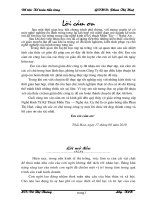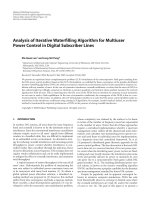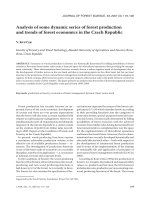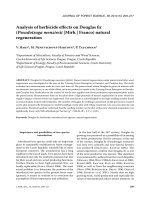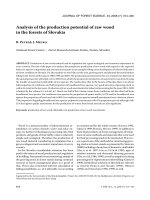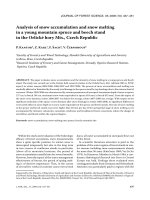Báo cáo tốt nghiệp: Analysis of Cambodian people’s demands for Viettel telecoms services”
Bạn đang xem bản rút gọn của tài liệu. Xem và tải ngay bản đầy đủ của tài liệu tại đây (286.9 KB, 41 trang )
INTERNSHIP REPORT
i
ACKNOWLEDGMENT
This Internship Report is the result of thirteen weeks of doing internship at
Viettel Corporation, doing writing during the spring of 2010. It has been an
interesting and learning experience. In fulfilling this report, I would like to give my
special thanks to many people for their significant helps, contributions, and
recommendations during my writing process.
First of all, I would like to express my deepest sense of gratitude to my
supervisor, Principal lecturer M.A Ha Thi Kim Anh for her patient guidance,
encouragement and excellent advice throughout my study.
Secondly, my sincerely thanks are given to all of my lecturers at the National
Economics University for providing me with knowledge and instructions during my
time at university.
Thirdly, I would also like to give my heartfelt thanks to the authors who
provided me with valuable books for my report.
Fourthly, I am thankful to Ms Nguyen Thi Hoa, Header of International
Relations Department, Viettel Global, JSC, for her comment and positive spirit that
helped and inspired me in writing.
Last but not least, I take this opportunity to express my profound gratitude to
my beloved family and friends for their moral support and patience during my study
in National Economics University.
TRAN THI HUYEN TRANG
Tran Thi Huyen Trang - K48NEU
ii
INTERNSHIP REPORT
TABLE OF CONTENTS
ACKNOWLEDGMENT............................................................................................i
EXECUTIVE SUMMARY.......................................................................................ii
INTRODUCTION...................................................................................................iii
1. Introduction to the research topic.........................................................................iii
2. Rationales.............................................................................................................iv
3. Research questions...............................................................................................iv
4. Methodology........................................................................................................iv
CHAPTER I: INTRODUCTION..............................................................................1
I. General view of Viettel Corporation......................................................................1
1. Introduction to Viettel Corporation........................................................................1
2. Business Philosophy..............................................................................................2
3. Development attitudes...........................................................................................2
II. Problem................................................................................................................ 2
III. Research questions..............................................................................................3
IV. Methodology........................................................................................................4
V. Scope of the report...............................................................................................4
CHAPTER II: THEORETICAL FRAMEWORK.....................................................5
I. Introduction............................................................................................................5
II. Theories overview................................................................................................5
1. Business across borders.........................................................................................5
2. Characteristics affecting consumer behavior.........................................................6
3. Definition of customer satisfaction........................................................................7
4. Market penetration strategies.................................................................................7
CHAPTER III: ANALYSIS AND FINDINGS..........................................................9
I. The telecommunication market in Cambodia.........................................................9
1. The factors impact on the telecommunication market in Cambodia....................10
1.1 Political factor...................................................................................................10
1.2 Cultural factor....................................................................................................11
1.3 Developmental Factors......................................................................................12
1.3.1 Economics Factor...........................................................................................12
1.3.2 People’s living standards factor and intellectual levels factor...............................13
Tran Thi Huyen Trang - K48NEU
INTERNSHIP REPORT
iii
2.Evaluation of the potential of telecommunications market in Cambodia....................15
2.1 For mobile sector...............................................................................................16
2.2 For fixed-line sector..........................................................................................16
2.3 For internet sector..............................................................................................17
2.4 Conclusion.........................................................................................................17
II. Demands on using Viettel Telecoms services of Cambodian people..................18
1. Supplying ability of Viettel in Cambodia market.................................................18
1.1 In mobile sector.................................................................................................18
1.2 For internet sector..............................................................................................23
1.3 For fixed-line sector..........................................................................................23
1.4 Promotion programs and customers service......................................................24
2. Evaluation of Metfone supplying ability.............................................................26
2.1. The strengths of Metfone of supplying telecoms products and services...........26
2.1.1. Market share and various products................................................................26
2.1.2. Price .............................................................................................................27
2.1.3. Customer service...........................................................................................28
2.2. The difficulties of Metfone of supplying telecoms products and services........28
2.2.1. Fierce market competition.............................................................................28
2.2.2 BTS and ADSL activation due to lack of electricity.......................................28
CHAPTER IV: RECOMMENDATIONS................................................................29
I. For fierce market competition............................................................................29
1. Improve customer’s service.................................................................................29
2. Surmount electricity shortage..............................................................................30
3. Apply promotion and suitable price.....................................................................30
II. For BTS and ADSL activation due to lack of electricity....................................32
III. Conclusion.........................................................................................................32
CONCLUSION.......................................................................................................33
BIBLIOGRAPHY...................................................................................................34
Tran Thi Huyen Trang - K48NEU
INTERNSHIP REPORT
iv
EXECUTIVE SUMMARY
This report aims at analyzing the demand of Cambodian people for using
Viettel’s telecommunication services in general and for Viettel Telecoms
Corporation’s services in particular in order to find out whether Viettel has satisfied
the customers or not and how to best meet the requirements of them. In this report,
data and information have been collected and analyzed to find out what Cambodian
people need.
The report has been prepared and written in the period of 15 weeks of my
doing internship at Viettel Telecoms Corporation. All my data mentioned in this
report are collected from Viettel’s reports on telecoms market in Cambodia as well
as information from the government’s websites.
This report is consisted of 4 chapters. Chapter I gives general formation about
Viettel Telecoms Corporation such as business fields, business philosophy and
development attitudes. In addition, the main problem of that Viettel is encountering
has been pointed out. Chapter II provides the theoretical framework of this study.
Chapter III analyzed the Cambodian telecoms market, the supplying ability of
Viettel telecoms and the demand for using Viettel services of Cambodian people. In
this chapter, the advantages and disadvantages of each package of Viettel applied in
Cambodia have been evaluated. Chapter IV gives some recommendations for the
improvement of Viettel’s services as well as products in the hope that these
recommendations would make some contributions to the development of Viettel in
Cambodia under the brand name of Metfone.
Due to the shortage of time and experience of the author, this report may have
some mistakes. All the contributions are welcomed.
Tran Thi Huyen Trang - K48NEU
v
INTERNSHIP REPORT
INTRODUCTION
1. Introduction to the research topic:
Humans need communication, from the early period of history, a variety of
means of communication has been used for people to contact with each other such
as signals, radio, television and so forth. Which is now an integrated part of a
society, which is important in any communication process? The answer, actually, is
information. In every kind of communication, transferring information is considered
as the most important function. In terms of economics, information has been found
as a fundamental element for the efficient growth of an economy. “The electric
transfer mode, which includes broadcasting and telecommunication, plays a very
important role in information management” (Abolarin Damilola Oluwatobi 2006)
Telecommunication provides a lot for the world. “Not only does it create these
things as a product of itself, it benefits and enhances the whole world market by
creating a tighter community and allowing for quicker reaction time and exchange
of information”(Jake Rose 2007). Besides comfortable and useful products,
telecommunication also brings services, which are able to connect people in the
shortest and best convenient way. Development in telecommunication provides
helpful research and foundation for other technologies also.
Recognizing the increasing important role of telecommunication, especially in
the case of tightening the relationship among countries all over the world,
telecommunications operators of many nations are competing to build up their own
network in other countries. Therefore, it is crucial for marketers and investors to
discern how potential customers perceive the advantages of their telecoms network
and how to attract a large number of customer using their products and services. In
order to gain the competitive advantage, it is vital for organization to spend time as
well as money focusing on customers and their demand in particular.
According to Pham Tan, customer’ demands, relate to the requirements of
customers before, in, and after using or buying products of a company. Therefore, it
will be a big mistake if a business, especially a business that wants to invest into
foreign countries does not take customers into consideration and does not pay attention
to their demands. Viettel is not an exception, existing as a big telecommunication
corporation in Vietnam and realizing the difficulties in saturated domestic market as
Tran Thi Huyen Trang - K48NEU
INTERNSHIP REPORT
vi
well as the necessity to penetrate to other foreign market, it has its own steps and
strategies to do business across borders.
From the above background, I have chosen for myself the topic: “Analysis of
Cambodian people’s demands for Viettel telecoms services” in the hope that some
findings and recommendations of my report could be a reference for Viettel in
analyzing the demands of customers in Cambodia in order to best meet their
requirements.
2. Rationales:
In the growth of global economy and integration along with fierce competition
in telecommunication market in Vietnam, it is essential for Viettel Corporation to
expand to foreign markets. Cambodia is one of the two first foreign markets which
this military corporation want to penetrate into. It is the fact that customers are the
foremost important element needed to be considered by any enterprise or
corporation in doing business. Taking care of customers also means satisfying their
demands or desires. Therefore, doing research on Cambodian people’s demand is
one of the fundamental steps for Viettel to expand investment in this market.
3. Research questions:
In this internship report, the key question “How to best satisfy Cambodian
customer’s demands for using Viettel Telecoms services?” will be absolutely solved.
4. Methodology:
The desk-study method is mainly used during the time of writing this
internship report. In other words, this method is assessment of existing data,
an
investigation of the available facts and figures relevant to the report. The details
information which is related to this method will be illustrated in Chapter I.
Tran Thi Huyen Trang - K48NEU
1
INTERNSHIP REPORT
CHAPTER I: INTRODUCTION
I. General view of Viettel Corporation:
1. Introduction to Viettel Corporation:
Viettel Corporation is a state-owned enterprise, which was established under
the decision 336/QD-QP in 27/07/1993 granted by The Ministry of National
Defense and the decision 43/2005/QD-TTg in 02/05/2005 by the Prime Minister.
Transaction name: Viettel Corporation.
Address: No 1 Giang Van Minh street- Ba Dinh district- Hanoi City.
Tel:
(84-4) 6255 6789
Fax:
(84-4) 6299 6789
Website:
This corporation does business in the following fields:
Providing Posts and Telecommunications services
Developing software products for electronic, telecommunications,
communication technology, Internet.
Producing, assembly, repairing and trading in electric, telecommunications
electronic, communication technology and wireless electric receive – transmitting
equipments.
Constructing posts and telecommunications, communication technology,
electrical transmission works.
Doing surveys, developing posts and telecommunications, information
technology projects.
Training human resources for posts and telecommunications industry.
Investing in infrastructure, real estate, hotel, travel, warehouse and transportation.
Importing
and
exporting
equipment
for
electronic
and
communication, information technology projects
Producing pulp and paper products, carton
Pressing and printing services
Producing cards for post and telecommunication industry, services
industries
During 20 years doing business in telecommunications industry, Viettel has been
Tran Thi Huyen Trang - K48NEU
INTERNSHIP REPORT
2
gained many achievements and some international as well as national awards including:
Most well-known Brand in Post – Telecom – IT Industry, Vietnam award
elected by consumers
The first Vietnamese operator to invest directly overseas.
No.1 mobile operator in Vietnam with nation-wide GPRS coverage, 11
million subscribers base and one of fastest growing mobile operator worldwide
(Wireless Intelligence).
No. 1 transmission infrastructure.
No. 1 distribution channel in Vietnam.
2. Business Philosophy:
Since Viettel Corporation’s foundation, it has been in operation with the
following philosophy:
Each customer is a person - a specific individual, therefore he/she should be
respected, cared and served separately. Continuous innovation along with
customers’ comments will help Viettel to create products and services more perfect.
A business’s foundation is social development, Viettel commits to reinvest in
society through cohesion between business activities and charity activities.
Colleagues must behave honestly and maintain the mutual assistance in order
to build up the success for Viettel.
3. Development attitudes:
Along with the above philosophy, the following development attitudes also
contribute to the orientation in doing business of Viettel Corporation:
Combining economy with tight defense.
Investing in infrastructure.
Focusing on doing business based on customers’ orientation.
Developing rapidly and continuously reforming to adapt to the market.
II. Problem:
In the growth of global economy and integration along with fierce competition
in telecommunication market in Vietnam, it is essential for Viettel Corporation to
expand to foreign markets. As a company dealing with foreign invesment projects
for the purpose of expanding to new markets and spreading brandname as well as
prestige and reputation of Viettel, Viettel carefully carries out step by step of foreign
investment process. Customers play an increasingly important role in market
establishment, even in the existing or new market. Therefore, catching their
attentions, meeting their demands are the desire of any enterprise. Pham Tan
supposes that a firm cannot have loyal customers without having satisfied
Tran Thi Huyen Trang - K48NEU
INTERNSHIP REPORT
3
customers. Moreover, statistics show that growth in market share is strongly
correlated with customer satisfaction. Many enterprises have been making a serious
mistake that they “only make great efforts to take care of customers in the first
period” ( Pham Tan 2009) until customers are familliar with their products or
services but foget the importance of maintaining and improving relation between
two sides. In the concept of taking care customers, this mistake brings, actually,
disappointed fellings to customers. There are many reasons why customers left the
businesses, partly because of high prices, the changes in interest but the majority of
customers said they stopped using a product or service of the company because they
did not receive the proper care, or their complaints were not resolved quickly.
“Doing business doesnot dislike struggling in war, if you let yours customers’ hands
down, your competitors, immediately take them and even unfortunately the chance
will be taken away by yourselves”( Ibid). Thorougly perceving the importance of
customers, Viettel Corporation always sets target of serving customers as the
foremost important task. To attract customers and keep them along with company as
loyal customers, Viettel has been conducting a lot of researches which aim at
catching their needs and any changes in their demands. In that process, the
analyzing of customers’ demands always is considered as the most important task.
Cambodia is one of the two first foreign markets which this military
corporation wants to penetrate into. It is the fact that customer is the foremost
important element needed to be considered by any enterprise or corporation in
doing business. Taking care of customers also means taking care of their demands
or desires. Therefore, doing research on customers’ requirements or Cambodian
people’s demands is one of the fundamental steps for Viettel to expand investment
in this market.
III. Research questions:
The key question is “How to best satisfy Cambodian customer’s demands for
using Viettel Telecoms services?’’. To answer this core question, it is essential to
answer the following three questions:
i. How many Cambodian customers are using Viettel Telecoms services?
ii.What is the number of Cambodian customers, who are expected to use
Viettel Telecoms services in the future?
iii. What should Viettel do to best satisfy Viettel’s current customers and
attract potential customers?
Tran Thi Huyen Trang - K48NEU
INTERNSHIP REPORT
4
IV. Methodology:
The desk-study method is mainly used during the time of writing this
internship report. Most of materials are extracted from relevant books, articles and
documentations in both English and Vietnamese. The data, concepts, theories and
figures are collected to analyze the demands of Cambodian customers for Viettel
Telecoms services. Documentation is used as primary sources of information in
forms of books, articles and websites to collect data for this report, as well as
background information about the organization.
V.Scope of the report:
According to the requirements of writing internship report, this report is consisted
of about 33 pages. Therefore, the content of this report only focuses on analyzing
the demands of Cambodian people for using Viettel Telecoms services and giving
out some recommendations.
CHAPTER II: THEORETICAL FRAMEWORK
Tran Thi Huyen Trang - K48NEU
INTERNSHIP REPORT
5
I.Introduction:
Chapter I gives an over view of Viettel Corporation as well as the existing
problem that Viettel need to solve. That problem is related to analyzing Cambodian
customers’ demand for Viettel telecoms services in the case of Viettel wants to
expand its market by investing to foreign countries. It can be said that any issue
related to the key element of market -“customers” is so crucial and is concerned
about by any business. There are a plenty of ways and methods businesses have
done to make analysis of customers’ demands in order to catch up with any changes
in their interest.
In this chapter, theoretical framework, I would like to point out the theories
applied in my report, which includes chapter “Business across borders” (National
Economics University 2009), “Characteristics affecting consumers’ behaviors”
(Philip Kotler and Gary Amstrong 1996), “Definition of customer satisfaction”
(Ibid) and “Market penetration strategies” (Statistics Publish House 2008).
II. Theories overview:
1. Business across borders:
This chapter refers to 6 forms of separations in doing international business,
including political separation, physical separation, relational separation,
environmental separation, development separations and cultural separation. These
separations can be considered as the fundamental factors affecting each country’s
economy. In part I of my report, I apply three out of 6 factors mentioned above in
the purpose of finding out whether the Cambodia telecoms industry is potential or
not and there is any space for Viettel’s penetration. The three factors are politics,
culture and development.
“The political borders be drawn on maps create the most obvious form of
separation. Each nation has its own government that establishes and enforces its
own laws”. (National Economics University 2009:8). That is the way to protect the
country from any invasion by “unwanted people, products, financial transactions,
and even ideas” (Ibid). “Outward flows tend to cause less concern than inward
flows, however, many governments do try to prevent so-called capital flight and all
governments outward flows of income to verify that relevant taxes have been paid”
(Ibid). National government also creates a number of regulations that specify what
goods and services can be sold and how they are to be produced in their countries.
“There were 74 countries in 1950 and there are about 220 today” (Ibid) respect the
Tran Thi Huyen Trang - K48NEU
INTERNSHIP REPORT
6
increased importance of political separation in doing international business.
“Not all differences in the behavior of people from different countries can be
attributed solely to differences in natural environment or wealth. Instead, there is
an important role played by social interactions” (National Economics University
2009:18). This form of separation is easy and interesting to talk about informally
but very “difficult to analyze rigorously” (Ibid). Differences in culture have
important effects on the employment relationships at overseas affiliates of
multinational enterprises. In general, it may be so difficult to “simply replicate
practices that work well in one country to another country” (Ibid). This content is
needed to be considered by any enterprises want to do business across borders.
Rules of the road, manners, languages, currencies, systems of measurement or
product interfaces, and so forth must be taken into consideration. The way people
behave in life partly implies the way they think and act in work generally and do
business particularly. Telecommunications supplies services in telephone, internet,
broadband, mobile, which are related to distance communication, on the other side,
it also means creating relationship and bringing people closer and closer. Therefore,
taking care of behavior of people, or communication culture in details, and nation’s
culture in overview, of the country want to penetrate into, is the fundamental
requirement for any enterprises doing business in telecommunications field.
For the developmental factors, economics, people’s living standard and
intellectual levels are composed the main content. Each country has different
economy as well as the form of economy and unlike law code related to doing
business, which put strong effects on business result of any enterprises. People’s
living standards as well as intellectual levels of citizens also are needed be
considered for any enterprises.
2. Characteristics affecting consumer behavior:
Consumer purchases are influenced strongly by cultural, social, personal and
psychological characteristics. For the most part, enterprises cannot control such
factors, but they must take them into account. In my report, I would like to apply the
two factors such as personal and psychological characteristics to analyze the
demands in using Viettel telecoms services of Cambodian people.
In personal factors, I narrow down my research in three elements as age and
life-circle stage, occupations, personalities and self-concept. “People change their
goods and services they buy over their timelines.” (Philip Kotler and Gary
Tran Thi Huyen Trang - K48NEU
INTERNSHIP REPORT
7
Amstrong 1996:150). The enterprises have to define their target markets in terms of
life-cycle stage and develop appropriate products and plans for each stage. “A
person’s occupation also affects the goods and services bought.” (Ibid). Trying to
identify the occupation groups and specialize in marking products needed are so
crucial for businesses. “Personality refers to the unique psychological
characteristics that lead to relatively consistent and lasting responses to one’s own
environment” (Philip Kotler and Gary Amstrong 1996:153). Thus, in order to
understand customers’ behaviors, the businesses must first understand the
relationship between personalities and self-concept with their effects to consumers
buying decisions.
3. Definition of customer satisfaction.
“Customer satisfaction with a purchase depends on product’s performance
relative to a buyer’s expectations. A customer might experience various degrees of
satisfaction. If the product’s performance falls short of expectations, the customer is
dissatisfied. If performance matches expectations, the customer is satisfied. The last
one is if performance exceeds expectations, the customer is highly satisfied or
delighted.” (Philip Kotler and Gary Amstrong 1996:572). The work of businesses
herein is defining the level of expectation to best meet the desire of each consumer.
In this report, I would like to apply this theory to find out the satisfaction level of
Cambodia customers in the field of telecommunication, especially of Viettel
telecoms services in order to best meet the customer’s demands.
4. Market penetration strategies:
In this part, I would like to apply the theory related to the choice of market
penetration. “Beginning to penetrate into a new market requires a long-term plan
and great efforts. Before deciding the target customers in that market, it is essential
to analyze market’s characteristics, other competitors and chances to enter that
market” (Statistic Publish House 2008:35). Finding out information through
internet, joining exhibition, market researching and paying attention to the
differences in business culture, etc are the fundamental steps, which are necessary
to carry out. In my report, I also would like to apply “Methods of price setting in the
market”, which is included in this theory. “Your major objective in the market is
how to offer your product with the price that is not higher than other competitors’
prices. However, for the best sake, you should set the price at a lower level
especially in the penetration time. That method is called – setting penetration priceTran Thi Huyen Trang - K48NEU
INTERNSHIP REPORT
8
that means trying to gain the customer’s favor due to your attractive product.
(Statistic Publish House 2008:37)
Here is the list of the most important theories that play big role in my writing.
Thanks to them, I have clear orientation though this internship report in order to
analyze the difficulties that Viettel is facing with and find out some solutions to
solve those problems.
Tran Thi Huyen Trang - K48NEU
INTERNSHIP REPORT
9
CHAPTER III: ANALYSIS AND FINDINGS
I. The telecommunication market in Cambodia:
In the situation of wide effects by the global economics integration, it is
essential for Vietnam enterprises, in general and Viettel Corporation, in particular to
expand and cooperate with foreign businesses. On the own way in doing business
and developing brand name, bringing the fame and prestige of Viettel to the world,
this military corporation choose the neighbor country, Cambodia, which has a lot of
common characteristics with Vietnam to invest and expand market.
Cambodia is a country in Southeast Asia of incredible beauty, with famous ancient
temples, and a special history. Each year, Cambodia “receives millions of tourists”
(Central Intelligence Agency’s website 2010), who come to enjoy the country’s
awesome sights, especially Cambodia’s Angkor Vat- one of the Seven Wonders of
the World. In terms of tourism, Cambodia becomes more and more well-known up
to time. In the sense of economy, “Cambodia remains one of the world’s least
developed nations, with limited natural resources and a heavy dependence on
foreign aid” (Kassim Chin Humanity Foundation’s website 2007). However, this
country has put significant efforts to overcome any obstacle. In recent years, the
Cambodia economy has gained numerous achievements. In the word of economy,
“Cambodia is in 13th position in the latest set of business environment ratings for
the Asia Pacific region” (Business Monitor International 2010:13).
It can be said that, Viettel is the first telecommunications corporation of our
country penetrating into foreign market, in detail, Cambodia and Laos, being a
pioneer brings also advantages and disadvantages for Viettel. To be successful,
Viettel has to overcome the barriers and strengthen its existing advantages when it
perceives it self’s role in international business, especially in the field of
telecommunications. There are a number of factors that “collectively affect on
global business” (National Economic University 2009:8), including political
separation, economical separation, cultural separation, developmental separation
and so forth. Understanding these factors is essential for firms attempting to do
business across borders.
Tran Thi Huyen Trang - K48NEU
INTERNSHIP REPORT
10
1. The factors impact on the telecommunication market in Cambodia:
1.1 Political factor:
According to Business across Borders theory, “Each nation has its own
government that establishes and enforces its own law” (National Economics
University 2009:8). More than 200 countries in the world, means there are existing
more then 200 politics system and different law codes. These political regimes in
turn effect to the stability of society as well. Continuing in this set, the society is
stable or not affects a lot to the development of economy, especially in the sense of
foreign investment because this mostly is considered as the prerequisite condition.
Any activities related to foreign countries should take those nations’ laws into
consideration fore mostly. Therefore, getting knowledge of politics system of the
new country, new market is one of the key steps to open the door of success in
doing business in general and in telecommunications market, in particular.
Cambodian politics is “wide known by period of Khmer Rouge genocide”
(Central Intelligence Agency’s website 2010) which caused spread disruption within
the country. This is a regime of “constitutional monarchy” (Ibid). Moreover,
Cambodia is a member of the United Nation and the Association of Southeast Asia
Countries. The Central Intelligence Agency says that the country has political
stability from the 1990s to now. This stability in politics system brings the Asia
country a variety of chance to cooperate and receive investment from other
countries. The telecommunications market of Cambodia in recent years is on the
trend of development and seems to expose. “The government also opens the door
for foreign businesses” (Business Monitor International 2010: 16) and call for
investment in all fields, especially in telecommunications, the yield needs updating
news and modern technologies. Quelling all rebellions and disorders in society,
bringing peace to the country, all citizens as well as the economy also means bring
the chance of development to the nation. Cambodia is considered as one of the most
open economies in Asia region (Business-in-Asia.com 2010). The three events,
Cambodia Event ICT and Telecom World Expo 2009, and the event with content
“Building the sustainable IT industry and telecommunications in Cambodia”, (IDG
Cambodia’s website 2009) both were held by the Post and Telecommunications
department, Cambodia’s National ICT Development Authority (NiDA) and
Tran Thi Huyen Trang - K48NEU
INTERNSHIP REPORT
11
International Data group (IDG). Through these events, the organizers wished to
contribute to the development of IT and telecommunications field of Cambodia, call
for the investment from other countries as well as to share ideas and experience
together. These can be considered as the most important economics events held in last
year, marking the new turning point in the telecommunications market of Cambodia.
Obviously, the diplomatic relationship as well as political solidarity between
Vietnam and Cambodia is quite close and steadfast. That, actually, helps boost the
cooperative deals and enhance relation. In the context of developing the traditional
relations between Vietnam and Cambodia, Cambodian tends to use goods and
services of Vietnam, and Vietnam enterprises have more chances of getting potential
market partners with this neighbor country. “ The government and people of
Cambodia always open to welcome and look forward to the Vietnam enterprises,
committed to the good feelings, preference for Vietnam’s enterprises to invest and
set up business in Cambodia”, Mr Leewood Phu, Director of National IT and
secretary-general for Cambodia’s National ICT Development Authority (NiDA)
said, (Ministry of Natural Resources and Environment 2009).
To sum up, the politics factor is one of the foremost important elements should
be considered by any firms desire for invest and expand market to foreign countries.
Although some black characteristics in Cambodia politics system in the past which
brought bad effects to the development of Cambodian economy, the economy of
this Asia country has its own turning points on the way of development with the
brighter face in politics system as well as the society.
Cultural factor:
Differences in culture have important effects on the employment relationships
at overseas affecting multinational enterprises. In other words, this issue can be best
described in the idiom “When you come to Rome, do as Romans do”. Learning the
way to adapt to new environment, new culture is also learning the way to survive
and even make more profits in any circumstances. Rules of the road, manners,
languages, currencies, systems of measurement or product interfaces, and so forth
must be taken into consideration. The way people behave in life partly implies the
way they think and act in work generally and do business particularly.
Telecommunications supplies services in telephone, internet, broadband, mobile,
Tran Thi Huyen Trang - K48NEU
INTERNSHIP REPORT
12
which are related to distance communication, on the other side, it also means
creating relationship and bringing people closer and closer. Therefore, taking care of
behavior of people, or communication culture in details, and nation’s culture in
overview, of the country want to penetrate into, is the fundamental requirement for
any enterprises doing business in telecommunications field.
With the common characteristics of Asian culture, the country of Cambodia
has its own norms and regulations. Let’s take an example of the talking way of
Cambodian people. You should “talk so smoothly and softly, just express your
emotion at home, not at public places” (Khuon Bora 2008:45). It is forbidden in the
country possesses Angkor Vat- one of the Seven Wonders of the World if somebody
“behave uncontrollably” (Ibid) like “throwing something, holding hands, or strong
beating table during talking” (Ibid). Moreover, in terms of greeting, if you meet
someone with higher rank than you, “bow your head as low as possible” (Ibid) till
under the belt position of that person and pay attention to “take off your shoes and
hat whenever entering the temples” (Ibid). These differences in culture, actually,
creates distinguish style in doing business of Cambodian people, especially in the
field of telecommunications which fore mostly needs smooth and soft behavior in
contacting with other people but still needs strict regulation to maintain and develop
the business.
Developmental Factors:
Economical factor:
Each country has different economy as well as the form of economy and
unlike law code related to doing business, which put strong effects on business
result of any enterprises. In the country of Angkor Vat, a number of laws related to
economics activities are issued but lacking of implementation guideline (CambodiaAccounting and Auditing‘s website 2007).
Obviously, this carelessness in making-law and carrying out process causes
numerous confusion as well as difficulties for citizens in doing business legally. The
open trade policy along with the Agreement of Peace in Cambodia in 1991, “the
relation of Cambodia with financial assistant businesses, especially in private sector
has been enhanced” (Business Monitor International 2010:34). This partly brings out
and inner Cambodia businesses chances to enter the gate of Cambodia market.
Tran Thi Huyen Trang - K48NEU
INTERNSHIP REPORT
13
According to The Cambodia Daily Weekend, on average, Cambodia receives
$500 million each year from donors (in 2006, the number was $ 601 million). To
say about economy of a country, it is not enough without mentioning the
infrastructure and services system besides the legal system and law code. The
infrastructure here is still weak and transportation system contains lot of problems.
To clearly illustrate that, many roads are not paved, especially in rural and remote
areas, “poor irrigation system and health service have not been improved” (Central
Intelligence Agency’s website: 2009). In addition, prices of fundamental elements
needed for people’s survival like water, “electricity are higher compared with other
neighbor countries in the region” (Ibid). That can be considered as one barrier for
foreign business when deciding whether invest in Cambodia or not. However,
everything has two sides, both pros and cons of this economy bring it worthy result.
In telecommunications field, in 2008, “Cambodia has 45,100 main lines of
telephone in use, in the rank of 165 comparison to the world, and 4237 million
mobile cellular, in the rank of 93 comparison to the world and 74000 internet users,
ranks at 162 to the world” (Ibid).
As of early 2009, there were 8 companies providing mobile telephony services
and at least 12 companies providing internet access.
People’s living standards factor and intellectual levels factor:
After nearly 3 decades of civil war, Cambodia puts all its strengths and efforts
to integrate with global economy. However, this country of Angkor Vat still has a
long road needed to pass. The people here work major on agriculture, and “around
36% of residents have living cost under $1 per day” (Business Monitor
International 2010: 45). The gap between the rich and the poor in urban area with
rural one is larger and larger day by day. It is easy to see the difference between the
rich and poor from the following table:
Tran Thi Huyen Trang - K48NEU
14
INTERNSHIP REPORT
Table of consumption and stratification
Consumer expenditure per capita, US$
Poorest 20%, expenditure per capita
Richest 20%, expenditure per capita
Richest 10%, expenditure per capita
Middle 60%, expenditure per capita
Purchasing Power Parity
Consumer expenditure capita, US$
Poorest 20%, expenditure per capita
Richest 20%, expenditure per capita
Richest 10%, expenditure per capita
Middle 60%, expenditure per capita
252 323 340
86
110 116
625 801 844
877 1,124 1,185
183 235 247
1,620
551
4,017
5,636
1,177
2,110
717
5,233
7,343
1,533
2,211
752
5,482
7,693
1,606
371
126
920
1,291
270
422
144
1,047
1,469
307
484
164
1,199
1,683
351
2,320
789
5,754
8,074
1,686
2,424
824
6,011
8,435
1,761
na
na
na
na
na
E means estimated, na means not available.
Source: Business Monitor International 2010: 45
Clear and large distance between the rich and the poor and many levels in
society makes the telecoms market in Cambodia more various. Therefore, providing
and serving customers with lowest living’s standard till the ones at higher levels
properly are the foremost task of any telecoms enterprises.
In terms of intellectual levels of Cambodian people, the literacy level of citizens
here counts from residents, who can read and write, in the age of 15 and over. There are
73, 6% of the whole population can read and write, male accounts for 84, 7% and the
female accounts for 61, 1% (2004 latest) ( Central Intelligence Agency’s website 2009).
This country spends “just 1.7% of GDP on education expenditures, in the rank of 172
compared to the world” (Ibid).
It is essential for any telecoms enterprises which have desire to penetrate to
this market to take this matter into consideration. This market is just suitable with
the business having the long-term investment strategy and customer-based
objective. For the businesses just want to get profit as much and fast as possible,
Cambodia seems not to be favorable.
Tran Thi Huyen Trang - K48NEU
15
INTERNSHIP REPORT
2. Evaluation of the potential of telecommunications market in Cambodia:
Asia telecoms business environment rankings:
Country
Singapore
Japan
Australia
Malaysia
South Korea
Hong Kong
Taiwan
India
China
Indonesia
Pakistan
Philippines
Cambodia
Laos
Bangladesh
Vietnam
Thailand
Sri Lanka
Telecoms
Market
67.5
71.3
59.4
60.5
62.5
52.5
52.5
70.0
63.3
55.0
57.5
47.5
49.5
45.0
52.5
45.0
45.0
31.5
Country Independenc Country Telecoms
Structure
e of
Risk
Rating
Regulator
80.0
90.0
94.2
77.9
66.7
90.0
86.8
75.3
83.3
70.0
79.8
69.9
63.3
90.0
74.2
67.7
63.3
90.0
68.0
67.6
76.7
80.0
83.8
67.2
63.3
90.0
77.6
64.5
39.0
70.0
53.0
59.9
35.0
70.0
69.7
58.3
42.7
60.0
46.1
51.4
39.3
70.0
28.5
50.6
46.7
60.0
49.7
49.5
54.0
50.0
38.9
49.1
60.0
50.0
39.1
48.5
33.0
60.0
44.1
47.6
36.7
60.0
52.9
46.4
32.7
60.0
58.0
46.2
30.0
50.0
51.6
36.9
Rank
Q110
(Q409)
1 (2)
2 (1)
3 (3)
4 (4)
5 (6)
6 (5)
7 (7)
8 (8)
9 (9)
10 (=10)
11 (=10)
12 (12)
13 (13)
14 (15)
15 (14)
16 (17)
17 (16)
18 (18)
Source: Business Monitor International 2010: 13
“Cambodia remains in 13th position in BMI’s set of business environment
ratings for the Asia Pacific region” (Business Monitor International 2010: 13).
Cambodia’s telecoms market score “reflects strong potential exists for continued
customer growth over the next few years” (Ibid); especially the case in the mobile
sector. Mobile subscriber growth has accelerated, largely as a result of increased
competition and increased investment in the sector. However, that market has lots of
characteristics that impeded the development and expanding of telecoms field.
These include “the dependence of the mobile sector on prepaid users and the
extremely limited state of Cambodia’s wire line infrastructure” (The International
Development Research Center’s website 2009); this has traditionally had a negative
impact on the development of internet services in the country. Although the mobile
sector benefits from much private investment, the government generally retains a
strong influence in the telecoms sector.
Tran Thi Huyen Trang - K48NEU
INTERNSHIP REPORT
16
2.1 For mobile sector:
“The number of mobile subscribers in Cambodia continues to grow, with new
prepaid and postpaid customers driving the growth” (Business Monitor International
2010: 45). Moreover the demand for mobile value added services are strong and
expected to grow, a factor which “bodes well for future 3G growth” (Ibid).
The number of mobile subscriptions in Cambodia would appear “to be
accelerating due to the level of competition rising” (Ibid). The market has seen, in
the first few months of 2009, the introduction of three new service providers. These
additional operators are already having a significant impact on the market. For
example, by the end of March 2009, Viettel had risen to third position in the market
in terms of overall subscribers. The appearance of Viettel contributes to the
lowering services cost, which remains so high for a long time in Cambodia.
However, there is a danger that “this growth boost has been caused by
multiple SIM ownership and inactive SIMs among the population already having
access to mobile services” (Business Monitor International 2010: 46). The
increased competition will in the end force greater expansion of services and may
bring lots of benefit and convenience for the users.
It is anticipated that the year 2010 will see the decrease of number of mobile
subscribers, in more details, “growth of over 62% in 2009 may drop to 42.5% in
2010” (Business Monitor International 2010: 47). One base of that anticipation is as
the consequence of “slowdown in Cambodia’s economy affecting the income of
middle- and lower income consumers” (Ibid).
It is predicted that Cambodia’s mobile subscriber market will experience an
“annual growth rate of 25.9%” (ICT Statistics News log 2009). The strong
competition that has presented itself in the market is expected to drive market
growth. In part, investment in network expansion and the development of new
services should also contribute to this level of growth.
2.2 For fixed-line sector:
According to NiDA, there were around “42,000 fixed lines at the end of
February 2009, which was down from 43,417 at the end of December 2008”
(Business Monitor International 2010: 49). However, mobile telephony has been
growing impressively, and it is possible that “the slight decline in the number of fixedline connections marks the beginning of a more evident mobile substitution trend”
Tran Thi Huyen Trang - K48NEU
INTERNSHIP REPORT
17
(Business Monitor International 2010: 50). On the other hand, fixed-line penetration
remains extremely low. In the long term, it is anticipated that Cambodia’s fixed-line
market will grow over the future. Despite recent investments by government,
“fixed-line network coverage remains appear in Phnom Penh and the urban centers
of a few other provinces” (Ibid). It is expected to see some investment in
developing fixed-line infrastructure in rural areas. It is likely that fixed wireless
services will be at the centre of such initiatives. The expansion of fixed-line
infrastructure within rural areas is predicted to “generate further demand for fixed
telephony services” (Ibid). Even so, the growth rate is not expected to be significant
and will barely keep pace with the expansion of Cambodia’s population.
2.3 For internet sector:
There were around 40,000 internet subscribers in Cambodia, up from 20,402
at the end of 2008 and 10,831 at the end of 2007, according to the latest data from
NiDA, quarter I/2009. Much of the infrastructure development now has
concentrated on business and tourist centers rather than rural regions. Instead, it is
thought that increasing competition is having a more immediate on subscriber
numbers, by helping to lower costs and provide potential customers with more
connectivity options.
According to Business Monitor International’s estimation 2010, there were
60,600 internet users at the end of 2008. This is equivalent to 0.4% of the
population. In the short term, much of the new internet user growth is expected to
be based on an expanding number of subscribers, rather than an increase in the
number of internet users accessing the internet at shared facilities. “The annual
average growth rate of around 48% is expected to come true in the near future”
(Business Monitor International 2010: 54). This will help to raise Cambodia’s
internet user penetration rate to “around 3.8%” (Ibid) along to that time.
2.4 Conclusion:
From all the information mentioned above, it is the fact that, Cambodia market
exists as a competitive market but not less potential. Demands in using telecoms
services of people there are increasing day by day due to the higher attitudes of the
importance of telecommunication as well as its benefits in life and business. Not
only mobile market but internet sector and fixed-line sector also witnesses the
raising in demands of customers. Therefore, there is still chance left for Viettel,
which desires to expand products as well as brand name and prestige to Cambodia,
to penetrate into this country.
Tran Thi Huyen Trang - K48NEU
INTERNSHIP REPORT
18
II. Demands on using Viettel Telecoms services of Cambodian people.
In 19/02/2007 at InterContinental Cambodia Hotel, Viettel Cambodia Pte
inaugurated Metfone telecommunications services under the witnessing of vice
general director of Viettel Corporation and representative of Cambodia
governenment along with a number of representatives of other telecoms operators in
Cambodia. After only 3 months providing telecoms testing system, “Metfone had
500.000 people using its service” (Laodong.com.vn: 2009). Just over a year, Viettel
Cambodia has built up a complete Metfone network with a number of unique points
such as: extensive nationwide network with large capacity. In more details, there are
more than “1000 BTS stations, which is equivalent to 40% of total stations” (Ibid)
throughout the country, nationwide coverage and the “largest fiber optic transmission
network” (Ibid) of Cambodia with the length up to “5000 km across all of highways,
provinces, cities and reaching out to all borders area, as well as the remote ones and
even islands” (Ibid). Frankly, it can be said that Viettel Cambodia under the Metfone
brand has putting its great efforts to create foothold in customers’ minds.
1. Supplying ability of Viettel in Cambodia market.
In mobile sector:
Currently, 5 packages are applied in Cambodia market, including Meteco,
Metbiz, Metgold, Met4ver and MetTravel. The advantages as well as disadvantages
of these mobile packages will be analyzed as follows:
Meteco: This package includes some features like:
Pay only 6 c/min for within network calls
Charge per second, even across network calls
Do not pay monthly subscription charge
Keep balance even validity period is over
Call to MetHome: 5 cents/minute
Within network
Across network
Time 6:00 - 21:59
6 c/min
9 c/min
Time 22:00 - 5:59
5 c/min
7.2 c/min
SMS
2.5 c/SMS
4.0 c/SMS
International call
15 c/min – 24hrs and no code needed
Special rates for: Vietnam, Thailand, Laos, USA, Australia, Japan, China, Hong
Kong, Singapore, South Korea, Taiwan, others: 20c/min.
Source: />Using this package, customers have chances to receive the best price with only
6cents per minute within network calls, this price is cheaper 20% compared with
other telecoms operators in Cambodia. Moreover, as mentioned above, enjoying
Tran Thi Huyen Trang - K48NEU
19
INTERNSHIP REPORT
Meteco, customers do not have to pay any subscription charge except for the calls’
charge. Worrying about the lost balance when validity period will not happen with
Meteco, the user’s balance will be kept wholly until customers add credit to
lengthen the using time. However, the charge for calling across network is so high,
that leads to hesitation from customers when choosing Meteco. Frankly, this matter
should be taken into consideration by Metfone in order to find the most suitable
price for calling across network.
Metbiz:
This package is applied for group from 3 to 10 members and includes some
features like:
Free 30 minutes every month for each member to call within group
No deposit needed for business group
Time 6:00 - 21:59
Time 22:00 - 5:59
Monthly subscription
SMS
Within network
5 c/min
5 c/min
Across network
7.5 c/min
7.2 c/min
4$
2.0 c/SMS
4.0 c/SMS
Source: />In addition, there is a special policy applied for customers who consume highly
every month, such as:
- Deduction scheme: “If monthly usage amount is within the range >=$25 and
=<$50: deducts 50% monthly fee (monthly fee is only $2/month)” (Metfone’s
website 2009). If monthly usage amount is greater than $50: deducts 100% monthly
fee (monthly fee is only $0/month).
- Deduction procedure: The deducted amount will be included in the section of
Tariff Deduction in monthly Tariff Notification.
The policy of encouraging customers to use Viettel service does not stop with the
low price only, it continues to discount the charge for group of users from 3 to 10
members. With the special treatment, Metfone hopes to bring the most convenient
service as well as best quality to customers. It is easy to realize that, this Metbiz
provides the lowest call price, just 5 cents per minute within network and 7.5 cents
per minute in the rush hours from 6.00 to 21.59. This price is one of the most
successes of Metfone when focusing on the businessman, who need contact and
transact through mobile a lot. The disadvantage of Metbiz is $4 paid for monthly
Tran Thi Huyen Trang - K48NEU

